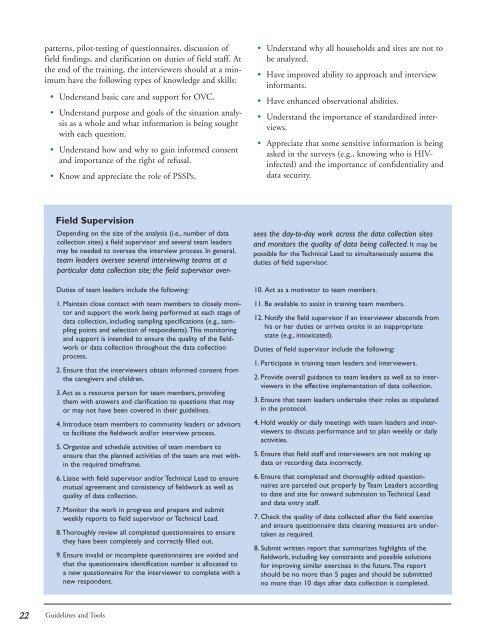Conducting a Participatory Situation Analysis of.pdf - Global HIV ...
Conducting a Participatory Situation Analysis of.pdf - Global HIV ...
Conducting a Participatory Situation Analysis of.pdf - Global HIV ...
Create successful ePaper yourself
Turn your PDF publications into a flip-book with our unique Google optimized e-Paper software.
patterns, pilot-testing <strong>of</strong> questionnaires, discussion <strong>of</strong><br />
field findings, and clarification on duties <strong>of</strong> field staff. At<br />
the end <strong>of</strong> the training, the interviewers should at a minimum<br />
have the following types <strong>of</strong> knowledge and skills:<br />
• Understand basic care and support for OVC.<br />
• Understand purpose and goals <strong>of</strong> the situation analysis<br />
as a whole and what information is being sought<br />
with each question.<br />
• Understand how and why to gain informed consent<br />
and importance <strong>of</strong> the right <strong>of</strong> refusal.<br />
• Know and appreciate the role <strong>of</strong> PSSPs.<br />
• Understand why all households and sites are not to<br />
be analyzed.<br />
• Have improved ability to approach and interview<br />
informants.<br />
• Have enhanced observational abilities.<br />
• Understand the importance <strong>of</strong> standardized interviews.<br />
• Appreciate that some sensitive information is being<br />
asked in the surveys (e.g., knowing who is <strong>HIV</strong>infected)<br />
and the importance <strong>of</strong> confidentiality and<br />
data security.<br />
Field Supervision<br />
Duties <strong>of</strong> team leaders include the following:<br />
1. Maintain close contact with team members to closely monitor<br />
and support the work being performed at each stage <strong>of</strong><br />
data collection, including sampling specifications (e.g., sampling<br />
points and selection <strong>of</strong> respondents).This monitoring<br />
and support is intended to ensure the quality <strong>of</strong> the fieldwork<br />
or data collection throughout the data collection<br />
process.<br />
2. Ensure that the interviewers obtain informed consent from<br />
the caregivers and children.<br />
3.Act as a resource person for team members, providing<br />
them with answers and clarification to questions that may<br />
or may not have been covered in their guidelines.<br />
4. Introduce team members to community leaders or advisors<br />
to facilitate the fieldwork and/or interview process.<br />
5. Organize and schedule activities <strong>of</strong> team members to<br />
ensure that the planned activities <strong>of</strong> the team are met within<br />
the required timeframe.<br />
6. Liaise with field supervisor and/or Technical Lead to ensure<br />
mutual agreement and consistency <strong>of</strong> fieldwork as well as<br />
quality <strong>of</strong> data collection.<br />
7. Monitor the work in progress and prepare and submit<br />
weekly reports to field supervisor or Technical Lead.<br />
8.Thoroughly review all completed questionnaires to ensure<br />
they have been completely and correctly filled out.<br />
9. Ensure invalid or incomplete questionnaires are voided and<br />
that the questionnaire identification number is allocated to<br />
a new questionnaire for the interviewer to complete with a<br />
new respondent.<br />
Depending on the size <strong>of</strong> the analysis (i.e., number <strong>of</strong> data<br />
collection sites) a field supervisor and several team leaders<br />
may be needed to oversee the interview process. In general,<br />
team leaders oversee several interviewing teams at a<br />
particular data collection site; the field supervisor oversees<br />
the day-to-day work across the data collection sites<br />
and monitors the quality <strong>of</strong> data being collected. It may be<br />
possible for the Technical Lead to simultaneously assume the<br />
duties <strong>of</strong> field supervisor.<br />
10. Act as a motivator to team members.<br />
11. Be available to assist in training team members.<br />
12. Notify the field supervisor if an interviewer absconds from<br />
his or her duties or arrives onsite in an inappropriate<br />
state (e.g., intoxicated).<br />
Duties <strong>of</strong> field supervisor include the following:<br />
1. Participate in training team leaders and interviewers.<br />
2. Provide overall guidance to team leaders as well as to interviewers<br />
in the effective implementation <strong>of</strong> data collection.<br />
3. Ensure that team leaders undertake their roles as stipulated<br />
in the protocol.<br />
4. Hold weekly or daily meetings with team leaders and interviewers<br />
to discuss performance and to plan weekly or daily<br />
activities.<br />
5. Ensure that field staff and interviewers are not making up<br />
data or recording data incorrectly.<br />
6. Ensure that completed and thoroughly edited questionnaires<br />
are parceled out properly by Team Leaders according<br />
to date and site for onward submission to Technical Lead<br />
and data entry staff.<br />
7. Check the quality <strong>of</strong> data collected after the field exercise<br />
and ensure questionnaire data cleaning measures are undertaken<br />
as required.<br />
8. Submit written report that summarizes highlights <strong>of</strong> the<br />
fieldwork, including key constraints and possible solutions<br />
for improving similar exercises in the future.The report<br />
should be no more than 5 pages and should be submitted<br />
no more than 10 days after data collection is completed.<br />
22<br />
Guidelines and Tools















